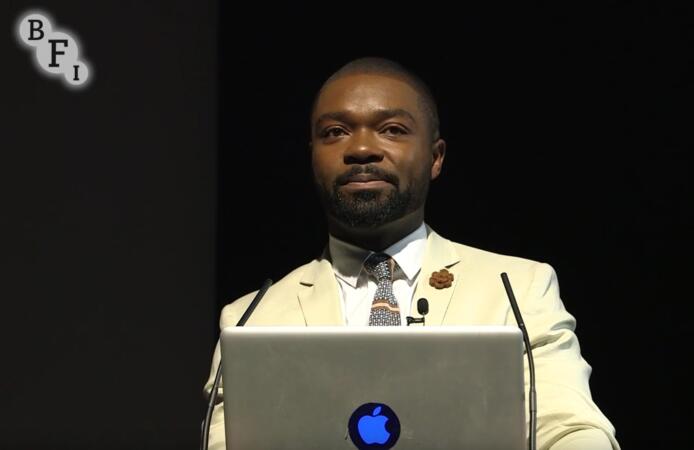
Amma Asante’s “A United Kingdom,” based on the real-life love story between an African prince and a working-class Englishwoman, opens with a scene of David Oyelowo’s Seretse Khama trading blows with a fellow classmate in a makeshift boxing ring, shaking off a vicious one-two combination of right hook and racial slur. The moment is partly meant to place us in time – London, 1947, with England still stubbornly maintaining the British Empire despite rising anti-colonial sentiment – but it’s also good foreshadowing for what we can expect from Khama the rest of the film. This is a man who steadfastly refuses to go down without a fight.
We soon discover that Khama is actually a prince in his native Bechuanaland (known today as Botswana), and while trading blows in the ring is not exactly traditional royal behavior, it quickly becomes clear that Khama is not a man bound by outdated tradition. Sent to London to get an education while his uncle rules in his stead, Seretse is preparing to return home when he meets the woman who will forever alter both his personal life and political legacy: a typist named Ruth, played by Rosamund Pike. The two swiftly fall head over heels via montage, exchanging jazz records in place of love letters, and Seretse soon asks Ruth to return to his homeland with him as his wife.
But theirs is no Grace Kelly love story, and from the outside, their marriage is viewed not just as a reflection of their love, but also as a powerful political act. Initially, the idea of a black king bringing home a white queen draws about as much opposition in Bechuanaland as it does in England, and most crucially, in neighboring South Africa. The powerful British ally is unwilling to tolerate the idea of a nearby royal interracial couple while they’re on the verge of instituting apartheid, exerting pressure on the English government to put a swift end to the Khamas’ storybook romance. Or at least contest Seretse’s right to rule.
Based on the book “Colour Bar” by Susan Williams, Asante’s film premieres in the USA in February 2017, and despite the significant opposition the Khamas faced, their story thankfully comes with a happy ending: Botswana is currently celebrating the 50th anniversary of their independence in 2016 after Khama became the country’s first democratically-elected president in 1966. And Asante manages to turn their extraordinary tale into an earnest, inspiring crowd-pleaser, capped off by strong performances from its two leads.
After “Selma,” Oyelowo is a seasoned pro at playing rousing historical figures at this point; simply watching the man give an impassioned speech has become worth the price of admission these days. (Sidenote: Oyelowo’s real-life wife Jessica shows up in a supporting role as the wife to a villainous British diplomat.) It’s not until the movie separates husband and wife, however, that the two really begin to shine, with Ruth staying behind in Africa, slowly winning over those who were initially reluctant to accept her, and Seretse once again fighting an uphill battle in London (only with diplomacy and political pressure this time as opposed to his fists).
Given the subject matter – a historical love story about an interracial couple fighting for acceptance – you can draw comparisons to fellow TIFF entry “Loving;” like the Lovings, the Khamas are also threatened with banishment. But Asante’s film is a much more angry, defiant movie than Nichols’. It’s also a more conventional one, hitting all the familiar notes we’ve come to expect from this genre. “A United Kingdom” is the third feature for Asante, who previously directed the acclaimed “Belle,” and there’s some merit to the claims that her film oversimplifies this true-life tale. But as the movie evolves to focus less on the couple’s different races and more about Khama and his country’s struggles against British colonialism, “A United Kingdom” takes on a crucial added dimension. It may hit some familiar notes along the way, but when the story is this good, you don’t really mind hearing it again.
“A United Kingdom” opens in USA theaters next Friday, February 10, distributed by Fox Searchlight. Ahead of the film’s release, Oyelowo sat for a lengthy conversation courtesy of SAG-AFTRA’s ongoing “Conversations with…” series (we’ve published several of these “Conversations” with other black actors in the recent past). Moderated by Jenelle Riley of Variety, the SAG-AFTRA Foundation “Conversations” program offers inspiring Q&As and career retrospectives with well-known actors who explore the process and profession of acting with an audience of fellow performers; they also reflect on personal experiences and artistic influences that informed and shaped their careers, discuss past and current projects, share valuable insights into the craft and industry, and preserve their creative legacies in the Actors Archive.
The 45-minute conversation with Oyelowo, which took place on February 1 and was videotaped, is now online and embedded below:
Rick Mele is a Toronto-based entertainment writer who covers all things film, TV, and pop culture-related, and doesn’t normally refer to himself in the third person.
